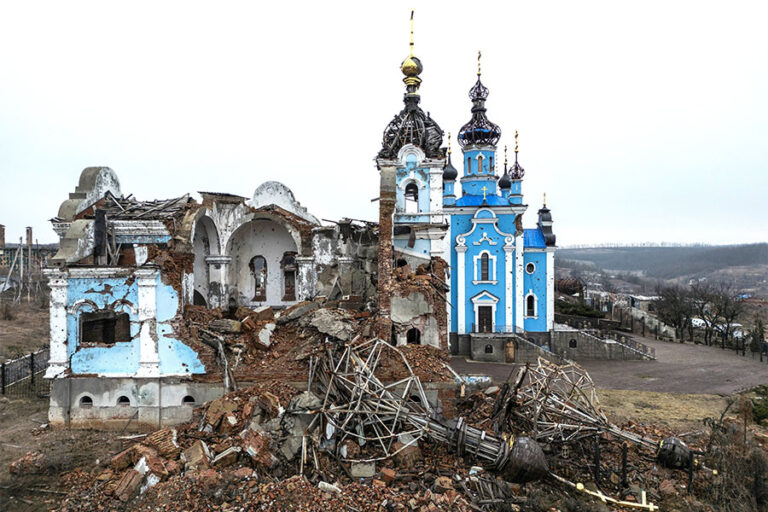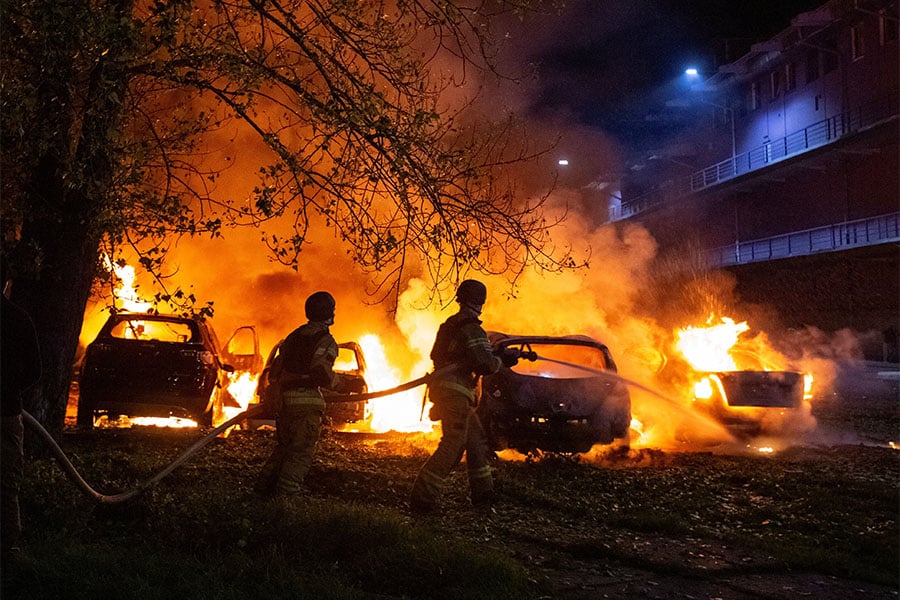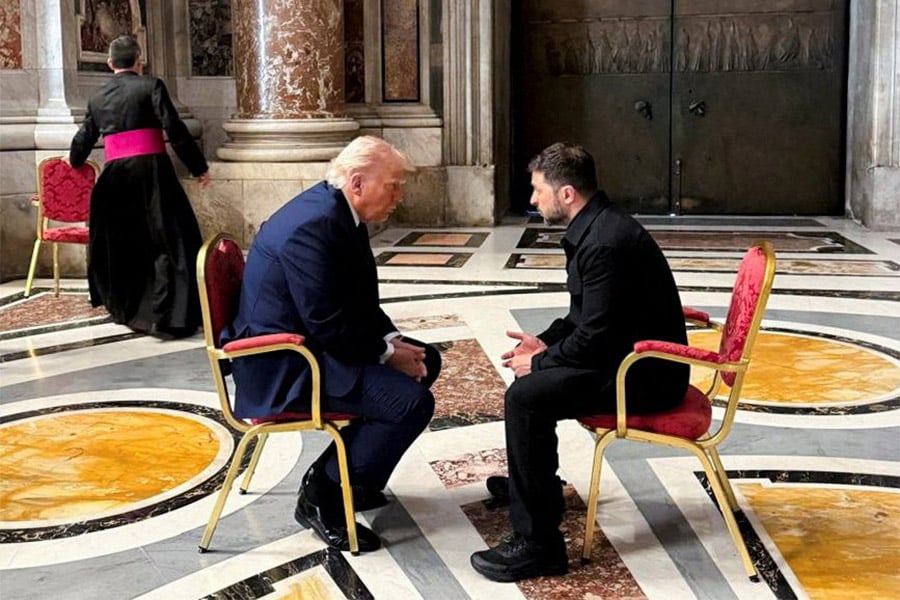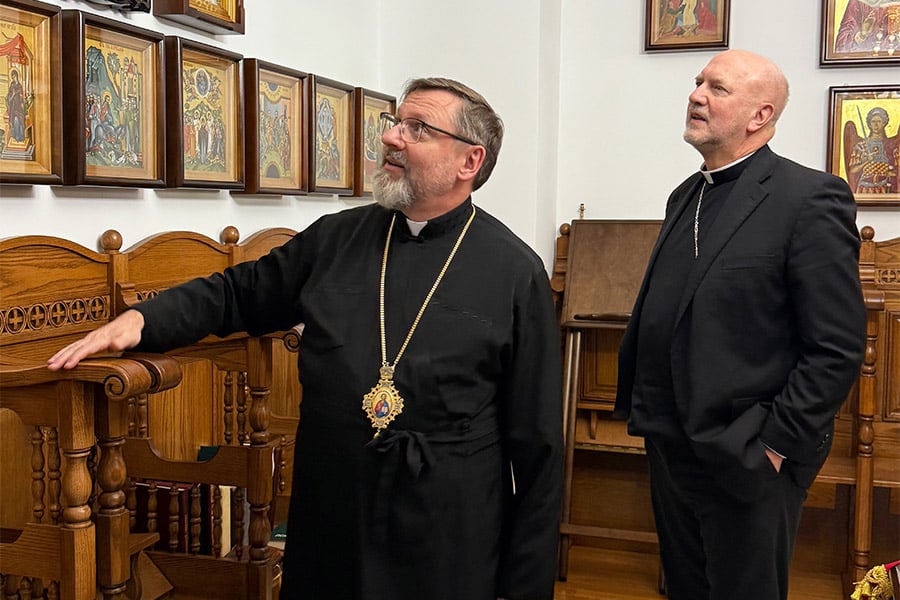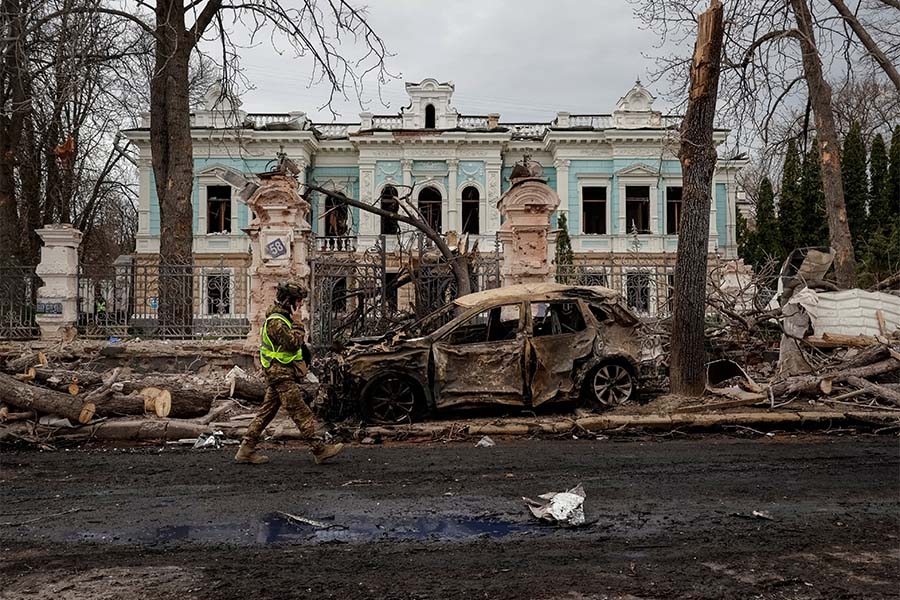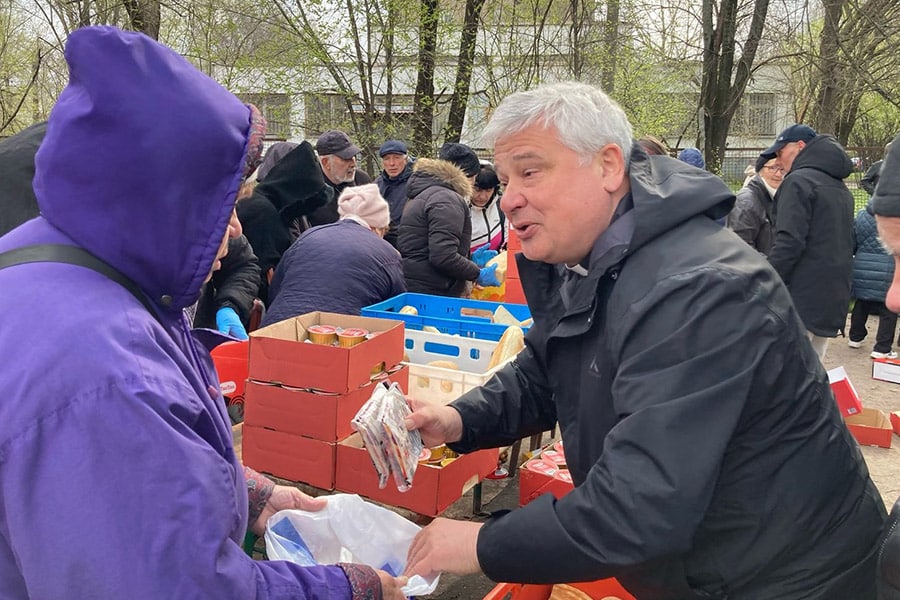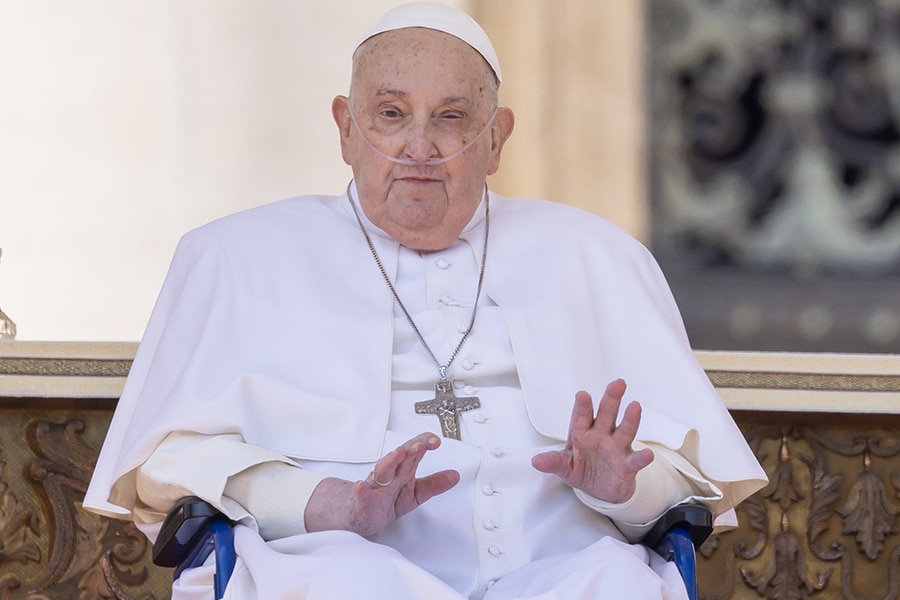Pope Francis and the Holy See tread a fine line in responding to Russia’s war on Ukraine, balancing statesmanship and spiritual values amid the 11-year conflict, said a Ukrainian Catholic church historian.
Anatolii Babynskyi, a postdoctoral fellow at the University of Notre Dame and a research fellow and lecturer at the Institute of Church History at Ukrainian Catholic University in Lviv, shared his insights during a July 25 lecture on “The Pope’s Tightrope Walk: Walking a narrow line between diplomacy and moral clarity in the context of Russian aggression against Ukraine.”
The presentation was sponsored and hosted by the St. Sophia Religious Association of Ukrainian Catholics at the organization’s U.S. offices in Elkins Park, Pa.
The nonprofit association was founded in 1974 by Cardinal Josyf Slipyj, who spent 18 years in Soviet captivity for his faith until his 1963 release, which was obtained through negotiations between Pope John XXIII and Soviet leader Nikita Khrushchev. Under the terms of the release, the cardinal was exiled to Rome, where he lived for two decades until his death in 1984.
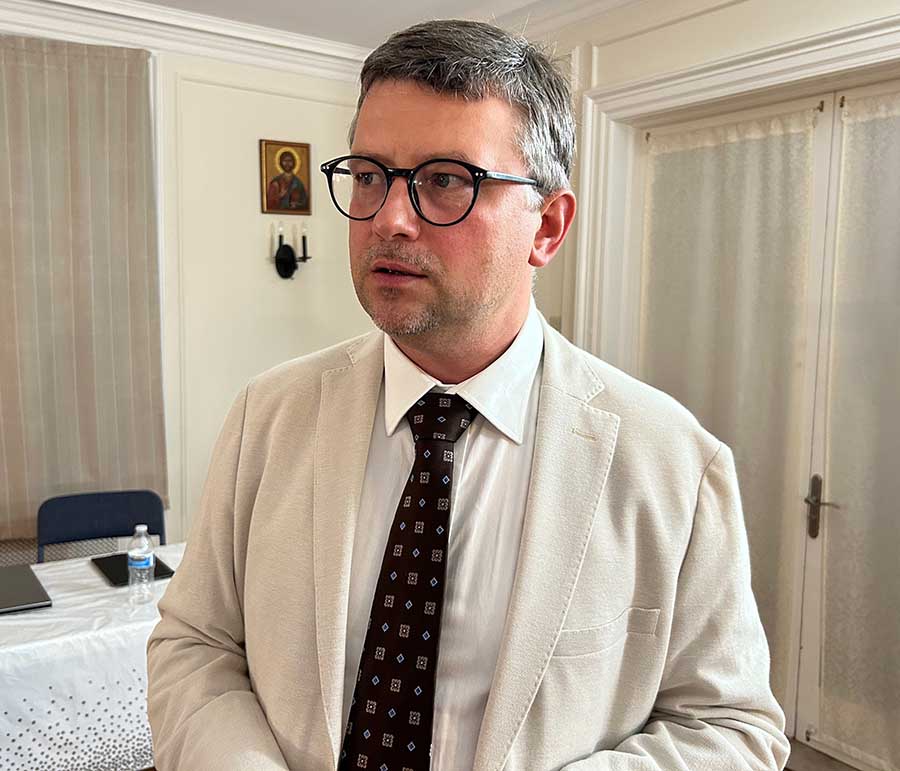
Babynskyi prefaced his talk by noting that, like the pope, he found himself “on a similar tightrope when speaking on this topic,” which has generated considerable controversy throughout Ukraine and the global Ukrainian community.
While frequently expressing his closeness to the Ukrainian people, appointing Vatican officials to mediate returns of prisoners and abducted Ukrainian children, and meeting with Ukraine President Volydymyr Zelenskyy, Pope Francis has at times made comments that have echoed Russian propaganda on the war.
In addition, he has steered clear of directly condemning Russia’s invasion of Ukraine, which was launched in 2014 and accelerated in 2022, and which has been declared a genocide by two prominent human rights organizations and the Organization for Security and Cooperation in Europe’s parliamentary assembly.
Yet “despite considerable criticism of the Holy See’s stance on the Russian aggression against Ukraine, the pope and Vatican diplomats working on this issue are not enemies of Ukraine,” said Babynskyi, pointing out that “Pope Francis has addressed the war several hundred times and continues to do so almost every week.”
However, “most of these addresses go unnoticed by the public, while only a few of his statements make headlines,” admitted Babynskyi.
He outlined “at least three levels at which the Vatican interacts with the issue of Russian aggression against Ukraine.”
The first is “how the Holy See reacts to wars in general,” Babynskyi said, explaining that the Vatican “has developed its own algorithms” in this regard.
Those algorithms reflect a “spirit of impartiality” championed under Pope Benedict XV by Vatican secretary of state Cardinal Pietro Gasparri, said Babynski, quoting the 1929 Lateran Treaty, under which the Holy See pledged to take “no part in any temporal rivalries between other states, nor in any international congresses called to settle such matters,” with Vatican City remaining “neutral and inviolable territory.”
Nonetheless, that historic approach is “not problem-free and may need to be revised,” especially given “current debate over the position of the Holy See during World War II,” said Babynskyi.
He said that “the discussion of Pope Pius XII’s position (during World War II) often overlaps with the discussion of Pope Francis’ position on Russian aggression against Ukraine and the international order as a whole.
“Both the actions of the Nazis in World War II and the current actions of Russia raise the question of how far one can go down the road of impartiality without contradicting one’s own moral values,” said Babynskyi.
Caution can risk becoming complicity, he said, given Russia’s aim of “destroying the system of human rights and the value of human dignity, which the Catholic Church considers fundamental to its social doctrine.”
Without explicit condemnation of Russia’s invasion, “the aggressor’s actions might continue unchecked, leading to further erosion of fundamental human values and prolonged suffering for the victims,” said Babynskyi.
At a second level, the Holy See views Eastern Europe through a particular lens — one that reflects how the Vatican has “for centuries … been building its strategy … with an eye on Moscow and the Russian Orthodox Church,” said Babynski.
However, in their desire to build ecumenical relations with the Russian Orthodox Church — evidenced by the historical reliance on a realpolitik and a fear of nuclear war — many at the Vatican have not “fully understood what has happened to the Russian (Orthodox) Church, which has been fully engaged in the propaganda of aggressive ideology,” said Babynskyi.
He stressed that “for the further healthy development of ecumenical dialogue,” the Vatican must forego “a nostalgic or romanticized view of Russian religious tradition” and recognize “the Russian (Orthodox) Church’s … involvement in promoting nationalist and expansionist ideologies that have justified acts of aggression.”
The third level Baynskyi highlighted was “the personality of the pope himself,” adding, “we Ukrainian Catholics are well aware of how important the pope’s personal history and his view of the world are.”
He cited pushback from Pope Paul VI and Vatican officials against Cardinal Slipy’s post-release efforts to convene a synod of Ukrainian Greek Catholic bishops in 1971.
Babynskyi said that he is “convinced that Pope Francis genuinely sympathizes with Ukrainians and cares deeply about Ukraine.”
However, “due to his upbringing and views on geopolitics, he does not always fully grasp the nature and essence of this war,” said Babynski.
In particular, Pope Francis’ Latin American background has shaped him to become “accustomed to the church’s existence under various political regimes and dictatorships” — which at times has seen the church drawn into such conflicts — and the pope may find himself overlooking systemic issues in those regimes in favor of simply “creating the most favorable conditions for the church’s presence,” said Babynskyi.
With the advent of nuclear weapons, calls to rethink the church’s teaching on the just war doctrine — referred to in the Catechism of the Catholic Church and the Compendium of the Social Doctrine of the Catholic Church as “legitimate defense” — have also impacted the pope’s approach, said Babynskyi.
Babynski summed up the Vatican’s approach to Russia’s war in Ukraine as marked by “a complex interplay … of history, geopolitics and religion.”
But as casualties continue to mount — with tens of thousands of deaths and injuries, close to 136,000 war crimes and at least 19,546 Ukrainian children abducted by Russia — the “stark realities” of the conflict demand “a clear, unequivocal condemnation of Russia’s actions,” he said.
“Only then can (the Vatican) hope to reconcile its pursuit for peace with its duty to stand in solidarity with the victims of aggression,” said Babynskyi.
Read More Crisis in Ukraine
Copyright © 2024 OSV News

